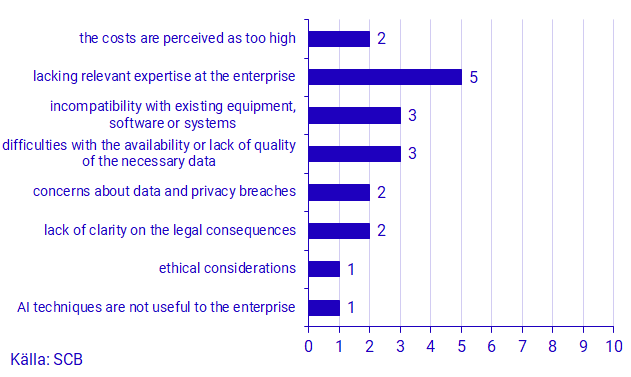ICT usage in enterprises, 2021
Ethical considerations among the lesser reasons to refrain from AI use.
Statistical news from Statistics Sweden 2021-11-25 9.30
Despite a major focus on ethical rules for AI at the international level and the ethical rules issued by the European Commission concerning reliable AI, 1 percent of all enterprises have refrained from using artificial intelligence due to ethical considerations.
For the reference year 2021, information was collected on the use of artificial intelligence (AI) from enterprises with 10 or more employees. Questions included asking what type of AI technology the enterprise uses and their reason for using this technology. If an enterprise did not use AI, their reasons for choosing not to implement this technology were also examined.
The most common use of AI technology was for automation of workflow or decision-making. Automated robots and digital assistants are examples of technology that automates workflow or helps in decision-making. In general, tasks carried out by these types of software robots are simple and routine, and are carried out quicker and more efficiently by the technology than by a human.
Technology for moving machinery through automated decisions, for example autonomous robots, self-driving vehicles, autonomous drones, were used to the smallest extent, at about 1 percent. Other technology used to a lesser extent among enterprises was voice recognition, technology that generates written or spoken language and technology for image recognition. About 2 percent of all enterprises used this technology.

Among enterprises that did not use any of the surveyed AI technology, 7 percent had considered using AI. In comparison between size classes, the large enterprises with 250 or more employees that considered to the largest extent implementing some AI technology. About 22 percent stated that they had considered it. Among medium-sized enterprises with 50 to 249 employees and small enterprises with 10 to 49 employees, this proportion was 13 percent and 6 percent, respectively.
The survey also examined reasons why an enterprise refrained from using the AI technology listed above. About 5 percent of enterprises stated that the main reason they refrained from using AI technology was the lack of relevant expertise at the enterprise. A lack of expertise is defined as insufficient human resources, knowledge or skills, specialists that are inaccessible at the enterprise, or difficulty recruiting suitable expertise.
Only 1 percent of enterprises that refrained from using AI technology stated ethical considerations as a reason. Despite the fact that ethical considerations was the least reason stated, it is a particularly important matter for the EU that seeks to regulate AI use to address the risks posed by this technology. The EU is considered to be at the forefront in terms of establishing frameworks for ethical rules for AI and has issued ethical guidelines for reliable AI that include the ethical dimension. The aim is to ensure compliance with ethical principles and values concerning respect for human autonomy, prevention of damage, and justice. Reliable AI should respect all relevant laws and ordinances, respect ethical principles and values, and should be robust from a technological and social perspective, since AI systems, even with good intentions, may inadvertently cause damage (ec.europa.eu).
Feel free to use the facts from this statistical news but remember to state Source: Statistics Sweden.
